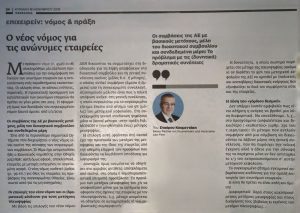
At Koumentakis & Associates Law Firm we have a deep faith in the values and benefits of preventive law practicing. We are not limited to just good conventional predictions and / or developing the right strategy in our clients’ affairs. We are proceeding with the evaluation of the adverse effects of existing legislation and, consequently, with proposals for legislative interventions to prevent them.
This includes the comments of Stavros Koumentakis, Senior Partner of our firm, on the (unfortunately poor) predictions while implementing the new Law on Sociétés Anonymes regarding its provisions for contracts between their shareholders and their directors.
The risk of abuse of existing legal options by shareholders of the minority acting in bad faith is (more) visible. Our proposed legislative intervention has already been adopted by FINF (Federation of Industries of North Greece) and has been properly processed.
The public debate has opened!
THE NEW LAW ON SOCIETE ANONYMES
The Contracts Of The S.A. With Main Shareholders, Members Of The Board Of The Directors And Related Parties: The Problem With The (Potential) Dramatic Consequences
A. INTRODUCTION: THE VIEW OF THE COMPANY
1. The New Law On Societes Anonymes
With the recent law (L. 4548/2018), a commendable effort to reform the law of Societes Anonymes as well as the replacement of a hundred-year (old) statute were concluded. Changes are, in some sections, sweeping. The (careful) adaptation of the articles of association of Societes Anonymes should take place in 2019. However, the effect of the provisions of this law begins immediately: from 1.1.2019.
2. The Contracts Of The S.A. With Main Shareholders, Members Of The Board Of The Directors And Related Parties
One of the most important issues that the new law is regulating is the conclusion of these contracts.
The matter has already been dealt with by the European Union legislator in Directive 2017/828: thus, this concerns exclusively companies listed on a regulated market. The new law adopts (Articles 97, 99 et seq.) the provisions of this Directive for all companies. Is this right for non-listed?
3. The Options Of The New Law And The (Dramatic) Risks For The Shareholders Of The Majority
Based on the options of the new law it is NOT entitled to participate in the decision-making process in the Board of Directors and the General Assembly the member of the BoD or any shareholder, who derives interest (directly or indirectly) from the particular transaction. It is noteworthy that the final decision belongs to the General Assembly, which is convened on this issue at the request of 5% (only) of the share capital. Only the remaining shareholders – in practice, i.e. ONLY the (usually one) minority shareholder – can vote in this particular General Assembly.
This choice (as it appears) is intended to protect the minority shareholders and the company itself from the unfair influence of the persons entitled to make decisions on its behalf.
Unfortunately, it is expected to lead to exactly the opposite effects to those that the Legislative Committee was looking at: The privilege of 5% minority shareholders to decide unilaterally on the matters relating to the company’s relations, for example, with the shareholder of the majority is expected to lead to abusive (and / or extortionist) behaviors.
The possibility, which tacitly is given to the majority shareholder (even if it owns 95% of the share capital of the SA) to defend himself with (multiannual and costly) legal actions, does not ensure his own interests nor the company’s.
 4. The Solution of the “Gordian Knot”
4. The Solution of the “Gordian Knot”
Therefore, there is no doubt that there is a strong need to find a different solution. For example, to return to the former (safer and fairer) “regime” (article 23a of Law 2190/1920): Shareholders who derive interest from a contract are entitled to participate in the General Assembly that will provide the final approval, but the authorization to conclude it will be provided only if it 1/3 of the share capital represented in it does not oppose.
This particular issue poses serious risks to the smooth operation of Sociétés Anonymes.
The solution should be simple and immediate!
Otherwise: The only ones to be happy shall be the malignant shareholders of the minority and their lawyers (and of course, the lawyers of the shareholders of the majority) ….
Β. THE DATA FROM A LEGAL POINT OF VIEW – THE PROPOSED SOLUTION
1. Preamble
1.1 According to the chairman of the legislative committee on the reform of the law of SA Prof. Evangelos Perakis (Evangelos Perrakis “The New Law of the Société Anonyme”, Nomiki Bibliothiki, 2018, p. 59) “two major issues of great difficulty were the subject of the new law … the question of the remuneration of the members of the board of directors … and the issue of related party transactions … of those transactions that are suspected of occurring through the unfair influence (and for the benefit of) persons controlling or managing the company …”
1.2 The Legislative Committee, which has been set up for this purpose, successfully completed the titanium project of the transition from hundred-year (old) statute (L.2190/1920) to a modern statute (Law 4548/2018) that will govern the operation of the Société Anonyme. However, in such a large project it would be impossible to avoid problems; some, indeed, serious.
2. Related Party Transactions Management – Selected Solutions
2.1 The way selected by the Legislative Committee for dealing with the above mentioned (under 1.1) significant problems and finally adopted by Law 4548/2018 is basically reflected in the provisions of Art. 97, 99 & 100 as well as to that of Art. 109.
2.2 The rule in Art. 99, par. 1, L. 4548/2018 provides for the prior authorization by the Board of Directors of the Société Anonyme for the purpose of concluding contracts with related parties (members of the BoD of the company, persons controlling the company, close members of their family, the legal entities controlled by them, General Directors and Managers of the company etc-99 par. 2)
2.3 The rule in Art. 97, par. 3, L. 4548/2018 provides that when there is a conflict of interest between the members of the Board of Directors (or the aforesaid, under 2.2, related persons) and the Société Anonyme, these members are NOT entitled to vote. As a matter of fact, if failure to vote concerns so many members so as not to have a quorum, the issue is referred to the General Assembly. However, even if the number of remaining members is adequate for the decision by the Board of Directors to be taken, a minority shareholder holding 1/20 (i.e. 5%) of the share capital may impose (in any event) the convening of a General Meeting with the subject of the provision of or not of the relevant approval (Article 100 (3)).
2.4 In the event that the person directly or indirectly involved in the conclusion of the contract happens to be a shareholder, the votes corresponding to his shares are not counted either in the quorum formation or in the majority (Article 100 (5)). Equally, however, neither the votes corresponding to the shares of the related parties are counted. Therefore: The minority shareholder of 5%, for example, (whether acting in good faith, or not), and he ALONE is the one who will take the decision concerning the shareholder of the majority – 95%, for example, after taking into consideration his personal view, and of course his personal interest, and not necessarily that of the company.
2.5 The choices of the new law (L. 4548/2018) and especially the abovementioned deprivation of the right to vote are based on the provision of Art. 9c (4) of Directive 2007/36 / EC (inserted by Directive 2017/828).
2.6 [As an aside, it is to be noted that the rule of Art. Article 99 (3) of Law 4548/2018 provides for a series of exceptions to the application of the above formal (and in our view problematic) procedure. From these exceptions, it is, in our view, to be proved more important in practice the exception provided in case (f): from the generally risky and problematic procedure are excluded the contracts of the company concluded with other directly or indirectly controlled ones, which are concluded with the objective of the interests of the company or from which the interests of the company and of the at shareholders of the minority are not jeopardized. This case is expected to be popular in practice, but it is quite vague as to its specific criteria while it concerns only part of the disputed transactions].
2.7 The above mentioned regarding the deprivation of the voting rights in the Board of Directors and the General Assembly, unfortunately also apply when remuneration is to be paid to the members of the Board of Directors in the framework of a special relationship (in the framework, for example, of the most commonly selected contracts of employment, management contracts or mandates – Article 109 (3)): In such cases, the SOLE member to decide is the shareholder of 5% and not the 95% shareholder (if the latter is also the member of the Board of Directors whom concerns the discussion of the fees to be paid).
2.8 Conclusion: In any of the above cases (: conclusion of a contract between the SA and related parties and / or members of the Board of Directors – the contracts for their remunerations included), and of course also in a number of others, is shown the absolute contradiction that the one to whom the power to take a potentially very important decision within a SA, is not the shareholder of 95% but the one of 5%.
 3. The Scientific Approach
3. The Scientific Approach
3.1 On the basis of what Prof. Evang. Perakis mentions (Evang. Perakis, “The New Law of Societe Anonyme”, Nomiki Bibliothiki, 2018, p. 63): “In any case, deprivation of the right to vote may be considered to be an excessive measure because of its possible consequences, as for example the ability of an obstructive minority of 1/20 of the share capital to seek for a General Assembly to convene in order to reject itself the transactions with shareholders – members of the management of the company with whom they have bad relations while the latter will be unable to vote. It must therefore be accepted that the refusal of the minority to grant the license to conclude the contract should also be reviewed under the provision of Article 281 of the Civil Code”.
3.2 The proposed by Professor Evang. Perakis solution (the judicial ascertainment of the abusive refusal of the shareholder holding the 5%) seems to refer the issue in the distant future and at considerable cost to the companies involved and, above all, to uncertainty as to the outcome. Business decisions, however, should not wait for long lasting legal procedures. It is widely known (to all, lawyers, entrepreneurs, “institutions”, etc.) what it means to wait for the issue of a final judgment (first instance proceedings, appeal) and / or an irrevocable decision on any matter; a fortiori, a judgement on the ascertainment (or not) of the abusive exercise of a right.
4. The Ratio of the Regulations of Directive 828/2017
4.1 The ratio of the regulations of Directive 828/2017 (beyond any doubt) is to ensure: (a) the smooth and unhindered operation of the companies whose shares are admitted to trading on a regulated market as well as the adequate management and performance of the company and (b) the encouragement of the long-term active participation of the shareholders and the improvement of the transparency between companies and investors; as it is already apparent from the recitals 2 and 3. The ultimate goal seems to be the smooth functioning of the “markets” in view of the participation of large sections of the population in Europe and of their general effect on the individual national economies. Particularly, in relation to the transactions of these companies with related parties, “adequate protection of the interests of the company and the shareholders who are not related, including minority shareholders” (recitals 42 and 43) is also sought.
4.2 These objectives and, more generally, the provisions of Directive 828/2017 refer explicitly to “listed” companies and do not extend to “non-listed” companies. This choice of the EU legislator is not accidental: If the reasons for the specific arrangements for “listed” companies were at the same or at a similar level as in the case of “unlisted”, it would be obvious that the latter would also be included (even with minor variations) in the regulatory scope of the Directive.
5. The Greek Reality
5.1 The rule of the Directive, as already mentioned, refers ONLY to the listed companies. However, it was consciously chosen by the relevant Legislative Committee to extend to the non-listed, ignoring the harsh Greek reality that has at least two strands:
(α) Until 2007, the creation of a single-member Société Anonyme was not allowed. Until then, we used to set up Sociétés Anonymes by providing a small percentage (for example 5%, and why not!) to a friend of the exclusive shareholder. Obviously, no one was aware that the percentage of 5% would be able to gain power in “life and death” …
(b) The shares of unlisted Sociétés Anonymes usually belong to a narrow circle of persons (members of the same family, close relatives or friends), whereas as a rule one person is the main shareholder and “runs” the company. Shareholders with small shares in the share capital either acquired them by transfer from the main shareholder or participated in the formation of the company (in both cases with or without payment of the corresponding “price”, having full knowledge of who is managing the company) or, finally, due to succession. Vesting them with the same heightened protection that the shareholders of the “listed” companies need due to the wide dispersion of their shares would not only be unjustified but would also turn these shareholders into potential blackmailers of the majority while it would undermine the proper operation of company and could even lead it to complete depreciation.
5.2 In view of this, the extension by Law 4548/2018 of the provisions of Article 9c (4) of the Directive (Articles 99-101 of Law 4548/2018) also to the “unlisted” companies not only is no self-evident but it is also lacking convincing justification. The legitimate weighting of the interests of the regulated entities in every legislation does not seem to justify the extension but, on the contrary, it fails to appreciate or, at the very least, does not adequately assess the reality of the “unlisted” companies mentioned above in 5.1 Thus, the reasons for the specific arrangements for “listed” companies do not apply neither in the same nor to a similar extent for “unlisted” companies”, which makes the Greek legislator’s choice for “expansion” to the latter problematic.
 6. The Proposed Solution
6. The Proposed Solution
The aforementioned leave no doubt that there is a major need to restrict the application of the provision of Art. 100 par. 5 of Law 4548/2018 to the listed companies and to amend it (before the beginning of the implementation of the new law-1.1.2019, with the additions in bold) as follows:
“Article 100 ….. Par.5.
(a) For a company with shares listed on a regulated market, in the case where the transaction concerns a shareholder of the company, that shareholder does not participate in the vote of the general assembly and is not counted for the formation of the quorum and the majority. Similarly, no other shareholders with whom the counterparty is linked by a relationship under Article 99 (2) shall participate in the vote.
(b) For a company with shares not listed on a regulated market, in the case where the transaction concerns a shareholder of the company, that shareholder participates in the vote of the general assembly and is calculated for the formation of the quorum and the majority. Similarly, other shareholders with whom the counterparty is linked by a relationship subject to paragraph 2 of Article 99 shall likewise participate in the vote. In that case, however, the provisions for the quorum and the majority of Articles 130 (3) and 132 (2) shall apply.”
7. Moral
This piece of legislation (Law 4548/2018) seems to be legally in order. It will be tested along the way. It is appreciated successfully.
The Legislative Committee seems to have done a great job. Its President continues to be, for us all, a teacher.
However, despite all these, it is a fact that the aforementioned provision of Art. 100 par. 5 seems (and is) problematic with regard to non-listed companies.
Its amendment is desirable, as above.

Stavros Koumentakis
Senior Partner
P.S. A shorter, Greek version of this article has been published in MAKEDONIA newspaper (November 18, 2018)


